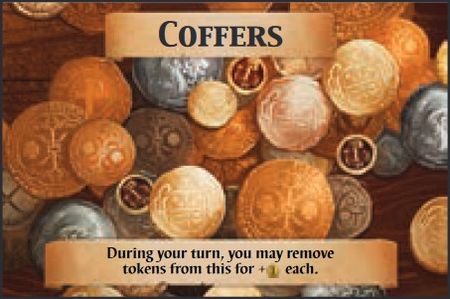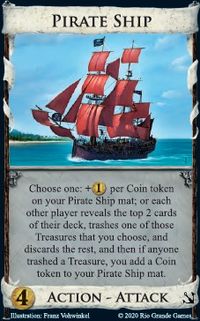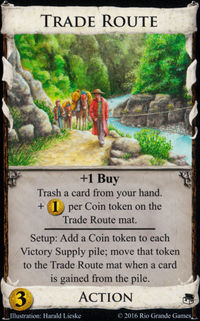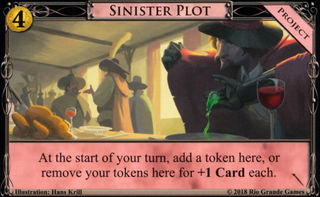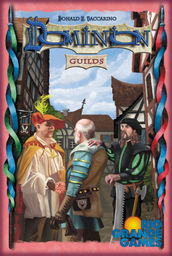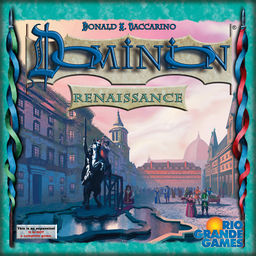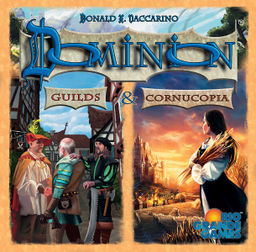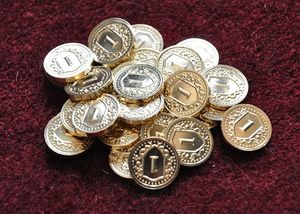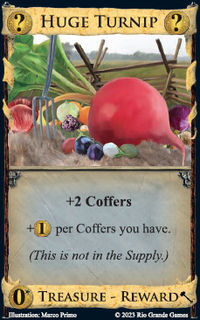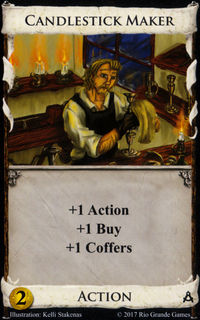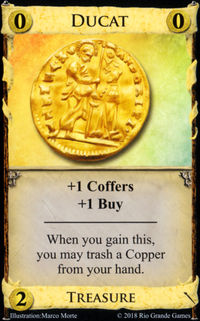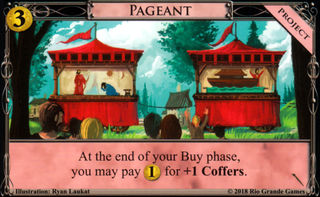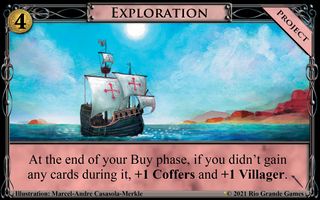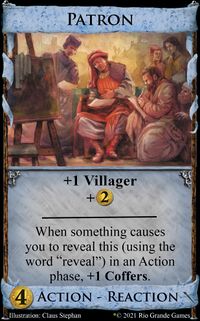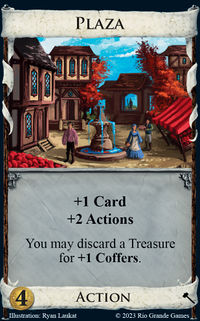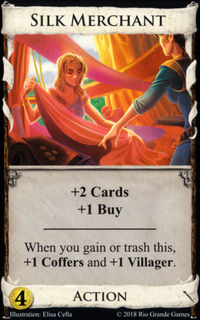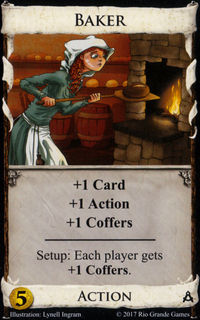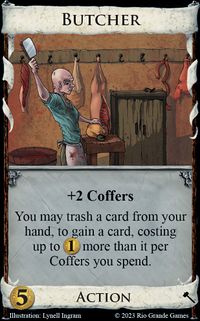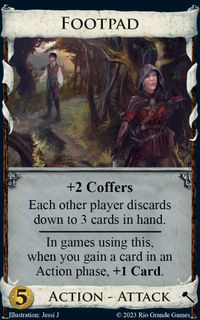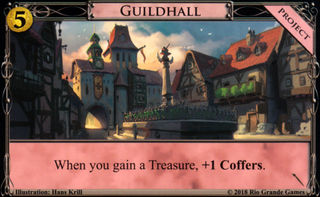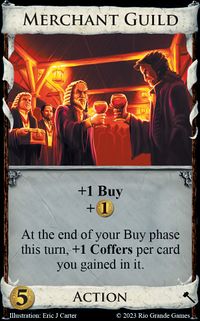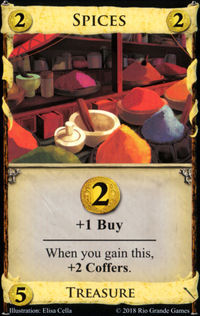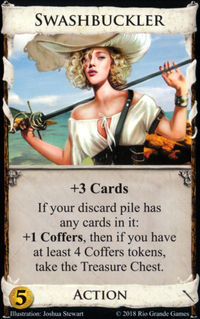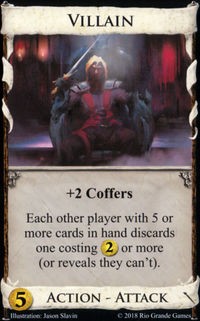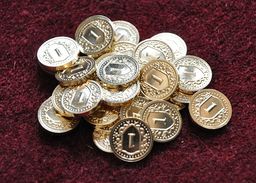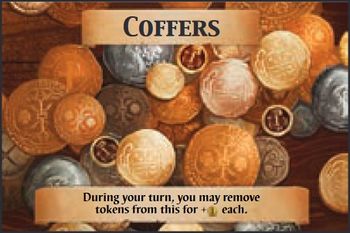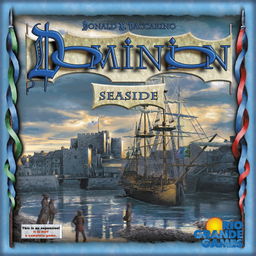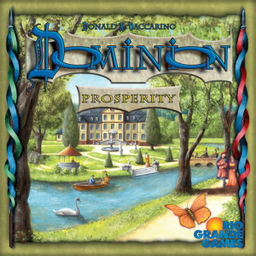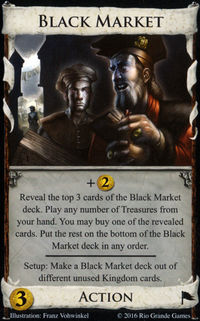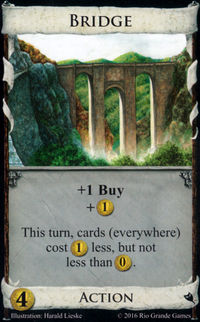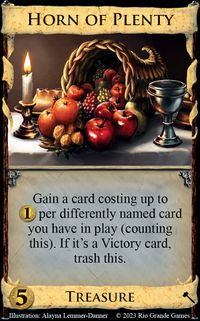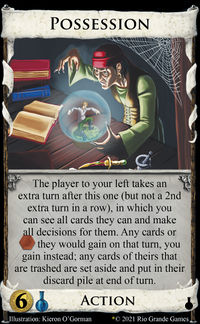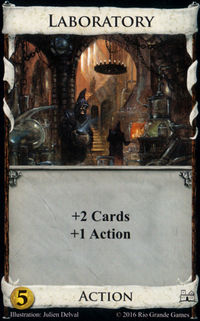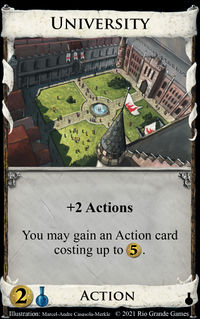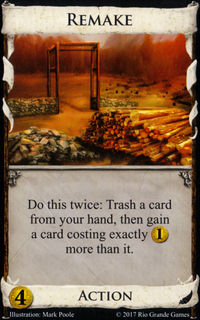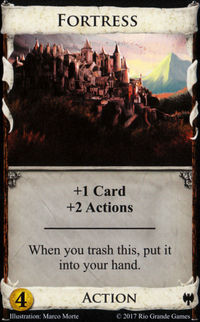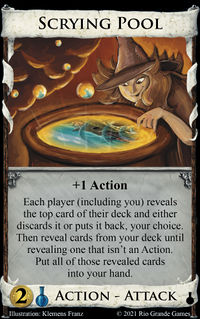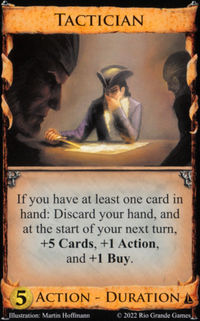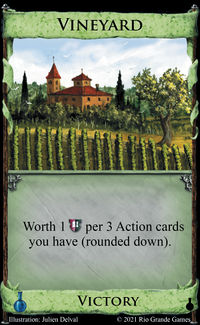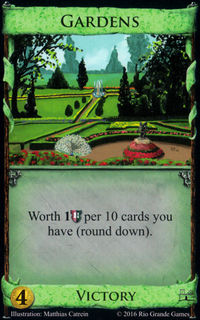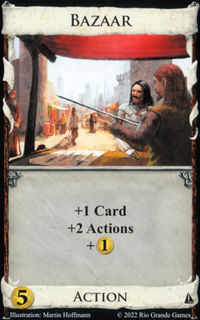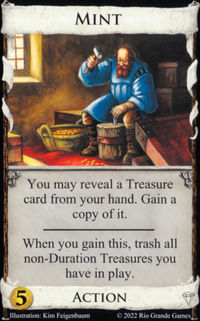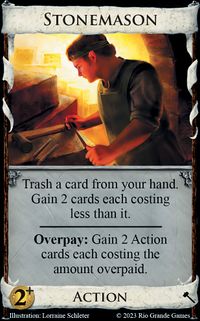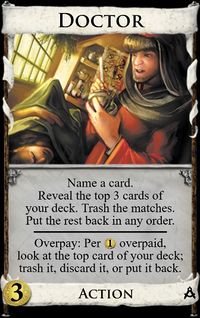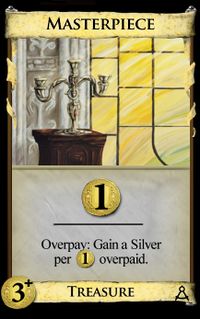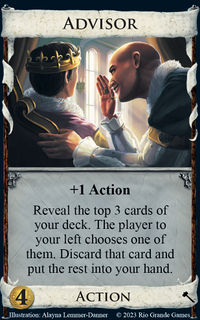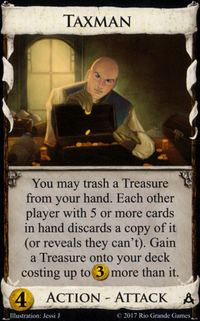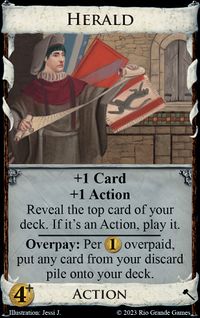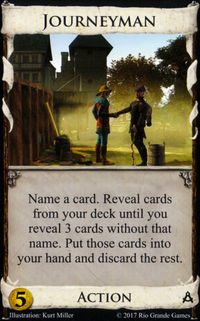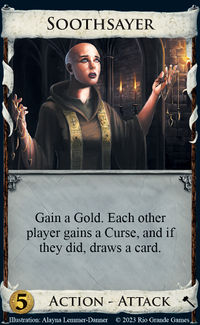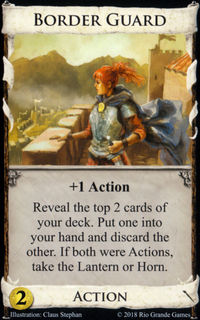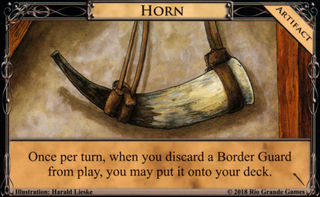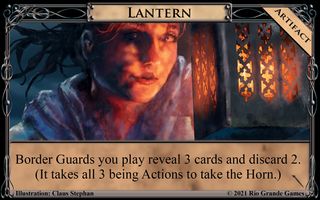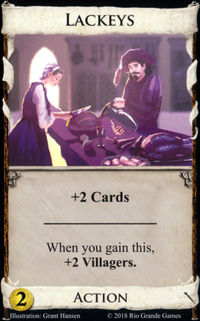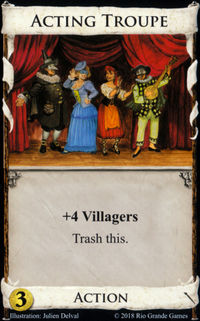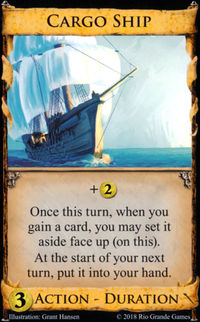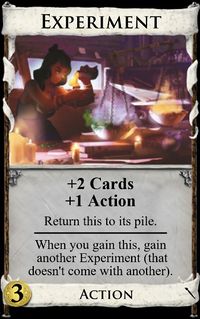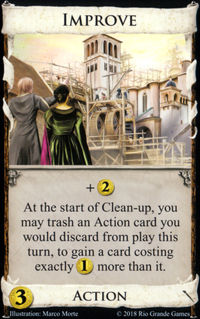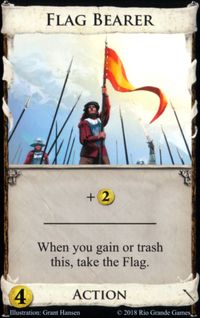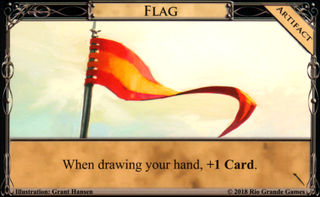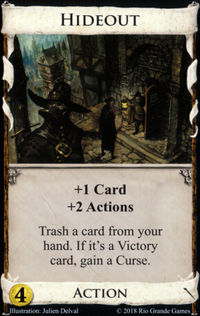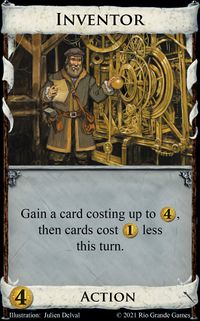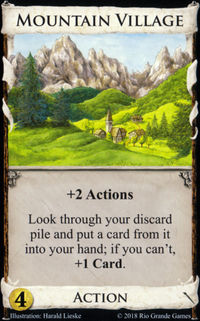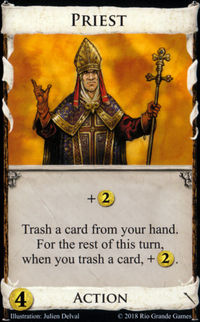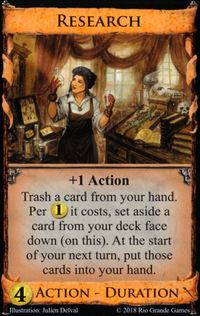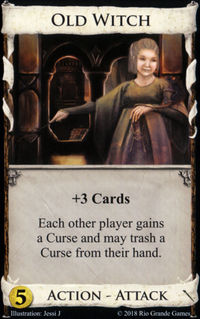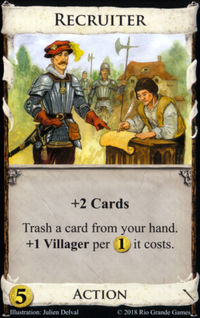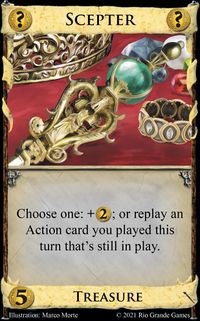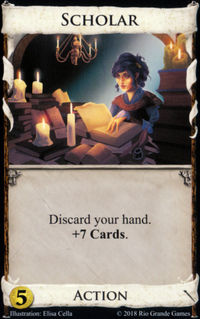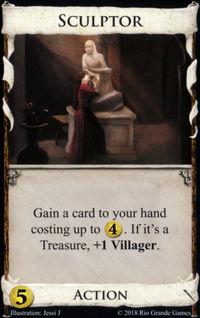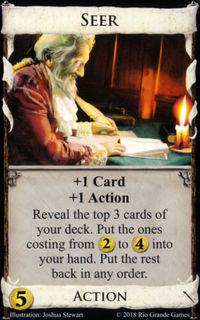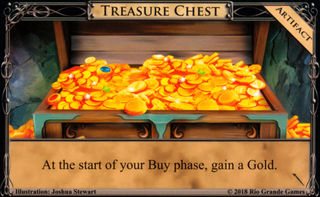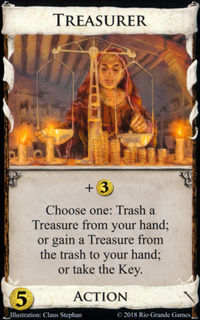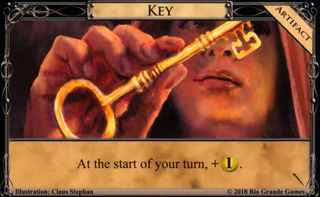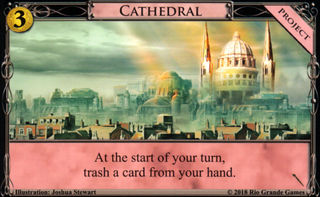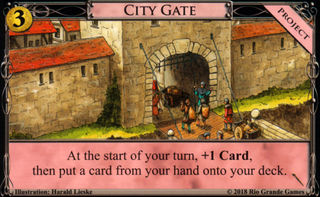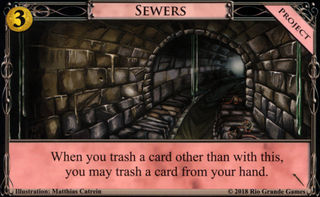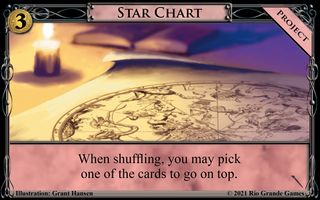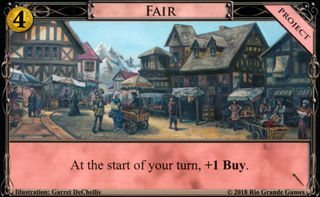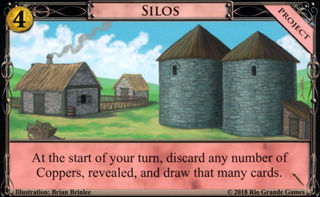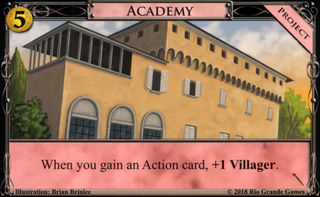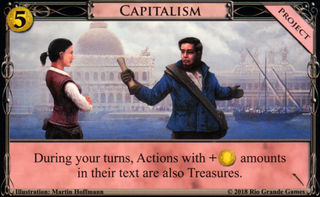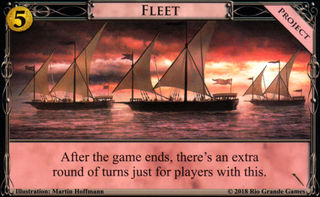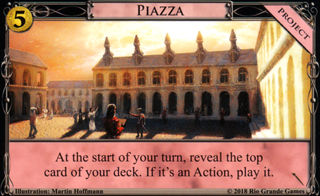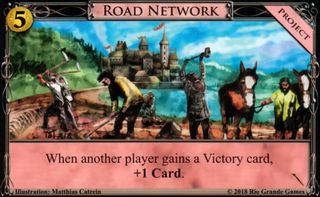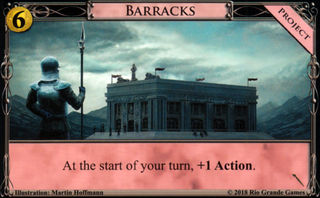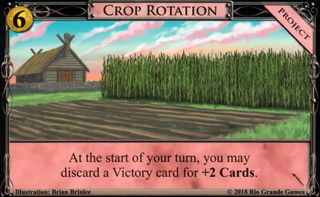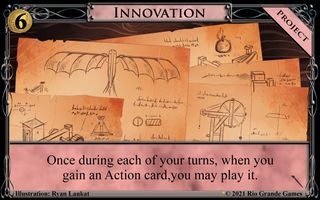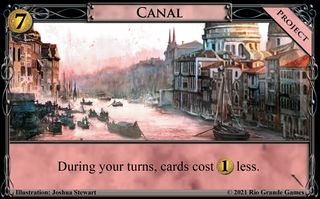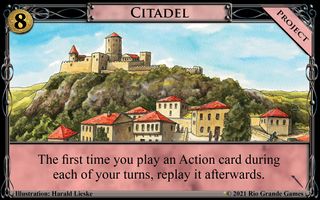Coffers
Coffers are the supply of tokens a player has on their Coffers mat or Coffers/Villagers mat, which can be spent to earn + each. Coffers are represented by Coin tokens, which are also used by Villagers, Pirate Ship, Trade Route, Sinister Plot, and Favors. They were introduced in Guilds and revisited in Renaissance.
Before the revised edition of the combined expansion Guilds & Cornucopia from 2017, Coffers were simply called "Coin tokens", and may sometimes still be referenced as such.
Contents |
[edit] List of cards and Projects using Coffers
- Huge Turnip
- Candlestick Maker, Ducat
- Pageant
- Exploration, Patron, Plaza, Silk Merchant
- Baker, Butcher, Footpad, Guildhall, Merchant Guild, Spices, Swashbuckler, Villain
[edit] Official Rules
[edit] Cornucopia & Guilds, Second Edition (2023)
Cornucopia & Guilds has mats for tracking Coffers, which let you save for later.
- Cards say "+1 Coffers" to mean, add a token to your Coffers mat. A token there can be removed at any time during your turn, for +.
- Any number of tokens can be removed at once, each giving +.
- Coin tokens are provided. They are not component-limited; players may use a substitute if they run out. The same tokens are in some other Dominion expansions; they can be mixed together.
- Tokens being used other ways cannot be removed for +; just tokens on the Coffers mat.
- Tokens come from the supply of tokens, and return there; they are not taken from other mats or other players.
[edit] Other rules clarifications
- The way spending Coffers works has been changed so that you can use Coffers at any time during your turn, including during an Action phase and after you buy cards. Forum Wiki
Deprecated official rules |
Guilds & Cornucopia (2018) |
|
Renaissance (2018)Renaissance has mats for tracking Coffers, which let you save for later. |
|
[edit] Basic Strategy
Original post by Polk5440
Coin tokens can be:
- Treated as virtual coin.
- Used for smoothing.
- Hoarded for big buys later.
[edit] Virtual Money
If you are playing an engine that produces X tokens every turn (on average), it's like you are producing in virtual money every turn (on average) in addition to whatever else your deck does. You can count on your overall buying power increasing by that much every turn thanks to Coin tokens. Your deck can usually buy a or a , but also produces a Coin token a turn? Then count on being able to buy a or a . Take that into consideration when making your buys.
[edit] Smoothing
Is hitting the same thing as losing your turn? Is getting a hand that produces only as good as one that produces ? Consider saving a few tokens to make up the difference! How many tokens you need to have on hand depends on how critical the gaps are, how many tokens your deck produces, how many you plan on using every turn for virtual money.
[edit] Hoarding
Maybe the goal is to produce a large number of Coin tokens and go for one big megaturn (don't forget you need buys!) which ends the game. In this type of strategy, Coin tokens to some extent function as a delayed Bridge or Horn of Plenty turn. When to pull the trigger and make those buys depends heavily on what you expect your opponent to do, too.
[edit] Pitfalls
Your goal should be to spend all your Coin tokens by the end of the game. If you are not hoarding and you find your Coin token total creeping up, 6, 8, 11, 15,... then you shouldn't be so stingy! Buy better stuff! You need to be treating more of your tokens as virtual money and bumping up your purchases to the next level.
Don't feel like you have to use your Coin tokens for their intended purpose. The Coin token you start Baker games with does not have to be spent on the opening. The two Coin tokens you get from Butcher do not have to be spent on Remodeling right now. You can spend 0, 1, or even 3 or more, instead! The Coin token you get from Candlestick Maker does not have to be saved. Sometimes you need to suck it up and treat your CM as a Copper this turn. Think about what your overall strategy is and how Coin tokens fit into that -- don't think about where the Coin tokens came from.
You don't need to trash a card with Butcher in order to bank two coin tokens. Also, you can gain the same card you trash with Butcher without using any coin tokens (e.g. Province). Use this to your advantage.
When someone buys Possession, that is a good time to spend all of your coin tokens!
[edit] Intermediate Strategy
Original article by -Stef-
A coin token is worth slightly more than a coin, because you don't necessarily have to spend it at the end of your turn. For most of these cards you can imagine a variant that gives coins instead of coin tokens, and you'd just have a slightly worse card. How much worse? That greatly depends on the kingdom, the game, your turn. The important thing to remember is this: most of the time you want to spend your money. You can use it to buy better cards, which in a turn or two will generate you even more money. So the most common case is that a coin token is exactly the same as a coin. If you don't spend it, it's sort of in your savings account, except you get a zero percent interest rate. Surely investing in your deck is better than that. There are of course exceptions, and that's where coin tokens get interesting:
- + could be better than + . Sometimes you really want a more expensive card to kick-start your deck.
- could be the same as . If there are no kingdom cards that cost , your coin goes to waste but your coin token doesn't.
- In the endgame it can be essential to buy multiple cards in one turn
Because coin tokens are slightly better than coins, they are also slightly more expensive. This is not actually a law of the universe but Donald made sure they are. However, for most of your spending power coins are just as good as coin tokens. You want to spend it anyway! So you should try to have the bulk of your money be cheap-ass plain old coins, while only a few in the form of tokens to provide you with all the flexibility you want. That is something all of these cards have in common: the first one you buy is the best. The second one is probably also ok. After that you need a good reason to go on. Of course this reason could exist, but that's card specific.
[edit] Mass Baker
This is just not a good strategy. The idea is to load up on a huge amount of coin tokens before you ever start to buy green cards, and then be totally unstoppable in the endgame. Although it is better than greening much too early, it's also far from optimal. You will lose to someone who starts the same but then mixes it up with cards that make more money. Spending on something that makes each turn is simply a bad ratio. Even something as simple as Gold + Laboratory (and that's really mediocre payload for a running engine) already has a much better payoff rate.
The only good reason to get more than a 2nd Baker is if they're free. Maybe University gains them for you, maybe you Remake some Fortresses. A reasonable reason to get more is if you really like the cantrips (Scrying Pool engine).
[edit] Mass Candlestick Makers
This is very comparable to the mass Baker argument. But now the cost is not in buying the card ( is very cheap) but in drawing it. Even in a double Tactician deck this doesn't really work out. Reasons to go on after the first two could be Vineyards, Gardens, or again Scrying Pool. But if that's not what you're going for - don't let the sweetness of your first Candlestick Maker lure you into buying a 3rd one, even if you have just to spare.
[edit] Mass Plaza
Plaza is a village and sometimes you just want those. Maybe you can cheat (draw-to-X) and then Plaza is a really good card for (in those decks the coin equivalent Bazaar costs ). If not, there is a reasonable chance mixing up Plazas with other villages is actually best.
[edit] Mass Butcher
This requires overdrawing your deck and a lot of extra actions. It's really rare that I take 3 or more Butchers. It's much more common that you want to maximize the usage of the first one or two you have.
[edit] Mass Merchant Guild
Don't go beyond your second Guild unless you think you can pull off the megaturn. You don't just need to be able to buy the 3rd, 4th and 5th Merchant Guild, you also need to draw them and have the spare actions to play them. Sometimes you can and then it's very powerful.
[edit] Endgame
Near the end of the game the value of coin tokens all of a sudden can go up very quickly. Buying a single Province may be losing while buying zero now and two next turn is winning. The tactical decisions involved can be very complicated, but in general it's something that is underestimated. Don't spend coin tokens near the end to get some extra components, unless you really know what you're doing. Feel free to buy extra Coppers with Merchant Guild in play.
[edit] Gallery
[edit] Kingdom cards
[edit] Projects
[edit] Trivia
Confusingly, Pirate Ship refers to its particular tokens as "Coin tokens"; however, these are only used to track its own -production, and cannot be spent. This confusion was part of the reason why the term "Coffers" was introduced.
[edit] In other languages
| Language | Name | Text | |
|---|---|---|---|
| Dutch | Geldkisten | 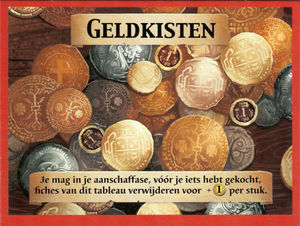 |
Je mag in je aanschaffase, vóór je iets hebt gekocht, fishes van dit tableau verwijderen voor + per stuk. |
| German | Taler (lit. thaler) |
[edit] Previews (Guilds)
[edit] Previews (Renaissance)
[edit] Secret History (Guilds)
[edit] Secret History (Renaissance)
In the end I felt like, we were eating up so much table space with mats, and hey what about being simpler. So there are just Coffers and Villagers. And they got those names and notation and then since we were updating Guilds for reprinting it got the Coffers mat too.
Coffers tokens were also problematic; when you have a giant pile of those tokens, it's pretty demoralizing for the other players, and sometimes it's even a good strategy. So only one card gives +2 Coffers each time it's played, and some only sometimes produce +Coffers, and some do it when-gained. Villagers tokens had no issues. Go ahead and get a bunch if you want.[edit] Change from "coin tokens" to the Coffers mat
It made sense to have a mat. It lets you put the rule for how they work right on the mat. It keeps the tokens distinct from ones used for Pirate Ship, or from unused tokens waiting to be used.
I had "Add a token to your Coffers." Well "+1 Coffers" is way shorter. And familiar, people get it immediately. It gets to go with the other +'s. It looks nice on the cards.
[edit] Thoughts on "before you buy anything"
It would be nice if you could use the Coffers tokens [after buying]. It is maybe not so bad even if the text on the Coffers mat is wrong; irl you constantly use Coffers tokens even after buying cards ("oops I use a Coffers token so I can also get..."), and no-one is going to be thinking, when this comes up, oh can I now not use Coffers tokens because of technical things. The rulebook doesn't cover it either though, it has the same description of functionality, where the idea was "you can't do this in the part of the buy phase where you buy cards" but that's not what it says.
The best of all possible worlds would have Coffers tokens just usable at any time in the Buy phase, with a different wording on Merchant Guild (e.g. delay the getting of tokens) and then some change or replacement for Spices. I don't get to do that though. And lots of rulebooks just went out with the current rules for Coffers tokens.
Again it was a poor decision to do things this way; I should have had Merchant Guild say e.g. "at the start of clean-up," and then when Spices came along I could figure out what I wanted there. I didn't need to settle for Merchant Guild giving you tokens you could immediately spend, though sure I could have tried that direction too.
And for that matter it would be great to allow playing treasures after buying cards. There are possible fixes for affected cards, e.g. "when you gain this, discard your hand and trash all Treasures you have in play" for Mint. IRL people constantly play treasures after buying cards. It's bad to have the rules technically go against that.
But you know, if you work on a game for 12 years without publishing it, of course you'll be able to publish a more polished version. I think the move was to get it out there.
